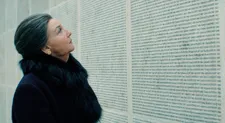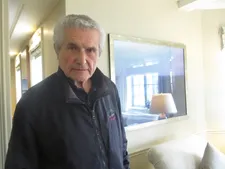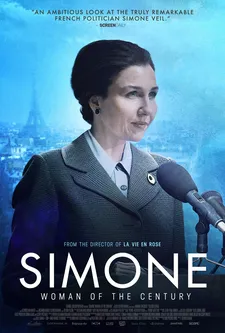Olivier Dahan’s all-embracing portrait, Simone: Woman Of The Century (Simone, Le Voyage Du Siècle), stars Elsa Zylberstein (Claude Lelouch’s Un + Une, L'Amour C'est Mieux Que La Vie, and his upcoming Finalement... Ou La folie Des Sentiments) as Simone Veil from 1968 till 2006, and Rebecca Marder (Arnaud Desplechin’s Tromperie and François Ozon’s Mon Crime) from 1942 through 1967.
Auschwitz survivor, Health Minister of France (she put an end to the criminalization of abortion), magistrate, mother, member of the Constitutional Council, advocate for the rights of women and prison reform, and the first President of the European Parliament, Simone Veil’s importance for the 20th and 21st century cannot be overstated. Dahan (La Vie En Rose with Marion Cotillard as Edith Piaf and Grace de Monaco with Nicole Kidman as Grace Kelly) is no stranger on depicting influential women.
 |
| Elsa Zylberstein as Simone Veil |
Many outside of France, or those too young to have seen Simone Veil speak on television news, will now have a chance to understand some of her immense importance through this remarkable portrayal, initiated by Elsa Zylberstein. Silence and misinformation are deadly, a fact Veil knew better than most. This challengingly structured film connects past with present, not in linear form but in fragments of story that come in waves. This is a film for now and especially for those for whom the binding of memory and history starts to unravel.
From Uzès in the South of France, Elsa Zylberstein joined me on Zoom for an in-depth conversation on Simone: Woman Of The Century.
Anne-Katrin Titze: Elsa, hi, very nice to meet you!
Elsa Zylberstein: Very nice to meet you!
AKT: Where are you?
 |
| Elsa Zylberstein: “After I decided to develop the film, I thought about Olivier Dahan.” |
EZ: I’m in the South of France, in Uzès in my house.
AKT: It looks beautiful.
EZ: It’s my parents’ house since 20 years.
AKT: You are the one who originated this film, this is your project! You were the one who said the entire world needs to know more about Simone Veil and I completely agree. Tell me about the kernel, the origin!
EZ: Yes, actually she had written her book on her story that came our ten years before and a friend of mine said, Elsa, you should meet her. I began discovering things on her and I was asked to give her a prize in a big place in Paris. I did a big speech in front of her and her family. And I don’t know why but because I was searching and I met her, we became kind of close and she came for dinner at my place, we had tea together. I felt a link between her and me. I thought her story is so amazing, all she went through, I want to do a film about her.
 |
| Elsa Zylberstein: “I think all she went through when she was 17 years old decided more or less her choices in life.” |
Something else happened, I never talked about this in the French newspapers, but now I can say it because it became the biggest success of the year in France and I feel free to say it. Someone from her family ran into me at the hairdressers and she said: “Oh my god Elsa, I know you know Simone and we just had lunch and she just told me if one day there’s a film on her, she wants you to play the part.
AKT: Oh that’s a wonderful endorsement!
EZ: I was not allowed to tell but it’s such a beautiful story, now I want to tell the story. I don’t want to seem pretentious and make the dead talking, but the true story is this.
AKT: It is beautiful. There are nuggets in the film, certain moments in the film that I loved. One of them is when you as Simone put down the first stone at the construction of the children’s hospital.
EZ: Yes!
 |
| Rebecca Marder as Simone Veil earlier in life |
AKT: It’s one of the most subtle scenes. Simone simply says “I used to do this” [implying when she was imprisoned in a Nazi camp]. The past jumps to the fore and envelops us in this moment. Then you look into the TV camera - it’s a great scene.
EZ: Yeah. After I decided to develop the film, I thought about Olivier Dahan. Because he had done an amazing work on La Vie En Rose, so I really chose Olivier. He wrote the script and chose the moments. This moment is very special, you’re right. I think in 1974 when she became Health Minister she began talking about who she is. In 1975 she said “look at who I am and what I went through” when she puts down that stone! “I don’t want to hide anymore.” All the people coming from the camps, they couldn’t talk about what they went through. No one was listening. There was shame. She was talking to Denise, to Milou, her sister.
AKT: There is an important sentence she says: “People don’t want to hear about other people’s suffering.”
 |
| Elsa Zylberstein: “Chanel created for me especially all the product that Simone was wearing around 1975.” |
EZ: Exactly! I think it was too violent, too horrible. They went through the unexpected; they went through horror. And it was hard for them to not talk about it. They went through horror and they met monsters. It was impossible to know what they went through. Olivier was very interested in that as well; talking 20 years later about what they experienced.
AKT: How much this film is of the present is stunning. I watched the link on July 13, which would have been Simone Veil’s 96th birthday, by chance. I didn’t know that. While watching, I received a Breaking News email from The New York Times about new abortion restrictions in the US military. Her legislature on abortion rights! Her prison reforms! This is about the right now! Yesterday I read in The Times about Texas eliminating libraries from certain schools and turning them into detention rooms and demonstrators holding up placards that said “Even prisons have books.” Books for prisoners was one of Simone Veils’s demands! It’s so much of the moment!
EZ: Yes! I think all she went through as a survivor of the Nazi concentration camps, her traumatic experience as a child during the Second World War literally sowed the seeds for her fight, for Europe, for abortion, for dignity for all people. I think all she went through when she was 17 years old decided more or less her choices in life. That’s why I wanted a film on her as well - she is talking about resilience. Why the film did 2.5 million seats, why it was a success, was the young generation as well. Young people discovered her through the film. I was stunned how many letters I got. So many girls wrote me, thank you Elsa, thank you Simone! For me it’s a political act to do a film.
 |
| Elsa Zylberstein at the wall of the Mémorial de la Shoah in Paris |
All the films I want to develop now are about women. I think it’s a political act as a woman, as a producer, as an actress. I’m very proud of the fact that girls 13 years old, 14 years old, are working on her now, knowing who she is. Because that’s what she would have loved, I am sure. Marceline Loridan-Ivens, Ginette Kolinka, Paul Schaffer, all the people I’ve met, I’ve interviewed, they’re obsessed with transmission of Never Forget. I think it’s very important for the film, which is not a documentary. Maybe for the younger generation it’s a better way to know her story.
AKT: The information has to get out. I spoke with Olivier Dahan five minutes ago about the wonderful quote near the end about memory and history. We are just at this point where the personal memory is fading and it does become history. On another note - you have become a Claude Lelouch regular!
EZ: Oh yeah!
AKT: He is such a wondrous man! Talking about history - I interviewed him at his hotel in New York and we talked so much that we missed the beginning of the premiere screening of Un + Une!
 |
| Simone Veil at Auschwitz |
EZ: Oh yes, we did Un + Une with Jean Dujardin. He was given an Oscar [in 2012 Best Performance by an Actor in a Leading Role for The Artist and we met on a plane. And we began talking and dreaming to do a film with Claude Lelouch. Literally after ten hours on the plane we thought: why don’t we do a love film with Claude? We land and we call Claude Lelouch and we said we want to do a film with you! That’s how he wrote the film!
AKT: That’s incredible! You are working on a new film with him?
EZ: It’s done! In mid-July I just finished.
AKT: As I said to him, there’s Howard Hawks and Bringing Up Baby and there’s Claude Lelouch films when you feel down.
EZ: He is amazing, he is alive and younger than anyone I know. He is a force of nature. He means cinema. Claude Lelouch means cinema.
AKT: Also to connect it back to Simone Veil, since this is what we are talking about, Lelouch told me that his mother hid him in cinemas during the war.
 |
| Elsa Zylberstein on Claude Lelouch: “He is a force of nature. He means cinema.” Photo: Anne-Katrin Titze |
EZ: Exactly! My father was a hidden child. Maybe I did it for my father, this film. Those people they know. Simone, it was like ’94 when I met her. When I say they are obsessed with transmission, it is about who will remember the story. Who is going to be there to tell the story? For me it was very important to do this. Knowing the film was the biggest hit this year, I’m very proud of that. Especially knowing as Olivier was saying, as you said, she legalized abortion in 1974/75. She was on the Assemblée Nationale in ’74. And every battle, every fight she had is still accurate.
AKT: Absolutely timely.
EZ: It’s so weird, as you said before, when you are getting this from The New York Times. I was thinking about America and how many states were against abortion. That’s why I want this film to come out in America. That’s why I think it’s a very important film for women, for us in America.
AKT: And Europe, she fought for, of course. And social solidarity all over the globe. We are at the brink right now.
EZ: Exactly!
AKT: I want to talk about something that may sound frivolous, but it’s not. [Care about clothes can show deep respect, as people like Bernard-Henri Lévy or Gay Talese can confirm] I loved the costumes you were wearing in the film, too.
 |
| Sylvie Testud as Marceline |
EZ: Oh yeah!
AKT: The coat, the scarves, the pumps!
EZ: Chanel created for me especially all the product that Simone was wearing around 1975. They created it all in the same quality and the same colours. So Chanel was a big help for me for that film.
AKT: I did not know that but it shows. I took note about important social issues and also jotted down: Great coats!
EZ: Yeah, great coats! It was hard getting to her. I wanted to know everything. I prepared the part for a year to get every breath, every act, every movement, the way she talks. I just dove into it for a year.
AKT: It shows that this is a labour of love and a labour of sincerity. A scene that expresses this is the one with the TV crew and the AIDS patient.
EZ: Yes, it’s beautiful!
 |
| Simone: Woman Of The Century poster |
AKT: She says, no, I’m not faking it, give me twenty minutes alone with a real patient!
EZ: I think it’s linked to what she went through as well. There’s no bullshit. Everybody was scared and didn’t know exactly. She was the first one to do this and of course it reminds her of what she went through, seeing how thin this man was.
AKT: Were there moments, despite you bringing the project to them and all the preparation, that surprised you? Experiences through making this film that were new to you?
EZ: Oh yeah! For sure I didn’t know the HIV patient thing and her work with drug addicts as well. She was always fighting against injustice, fighting for dignity, you know. I love this moment as well when she was talking about Yugoslavia. She was really someone fighting for people’s dignity. I didn’t know it was that strong. My models were Meryl Streep, obviously, or Gary Oldman as Churchill. So I didn’t want to play her, I wanted to become her. It was like I’d dive into her mind, her body. For me a big challenge as an actress was trying to do this.
AKT: The Yugoslavia moment is strong as she raises the question of learning from history. Are the authorities still saying; “Let’s win the war first and then deal with the people dying in concentration camps?” Another strong scene was with you and Laurence Côte.
EZ: Yes, she’s supposed to be Ginette Kolinka. I met Ginette, I’m still close to Ginette now. I went to Auschwitz with Ginette Kolinka. They were very linked, Marceline, Ginette and her. They were like sisters and they went through hell. They loved to meet for lunch every other Saturday, Marceline was telling me. They had to be together to talk about this.
AKT: Silencing is near the core of the film. Speak anyway! Make the film! Push forward! And you did! Simone Veil is not the past, she speaks to the now!
EZ: Exactly, so many layers, so many accurate things are in the film and there are some ghosts somewhere. That’s why it was so successful, I guess, the echo with today was really shocking and insane.
AKT: Thank you so much for doing this!
EZ: Thank you!
AKT: I’m looking forward to seeing the next Claude Lelouch film. He seems to be immortal!
EZ: Wonderful, yes, he is editing now. Exactly, the immortal Claude Lelouch! Thank you so much!
Simone: Woman Of The Century opens in US cinemas on Friday, August 18.






















